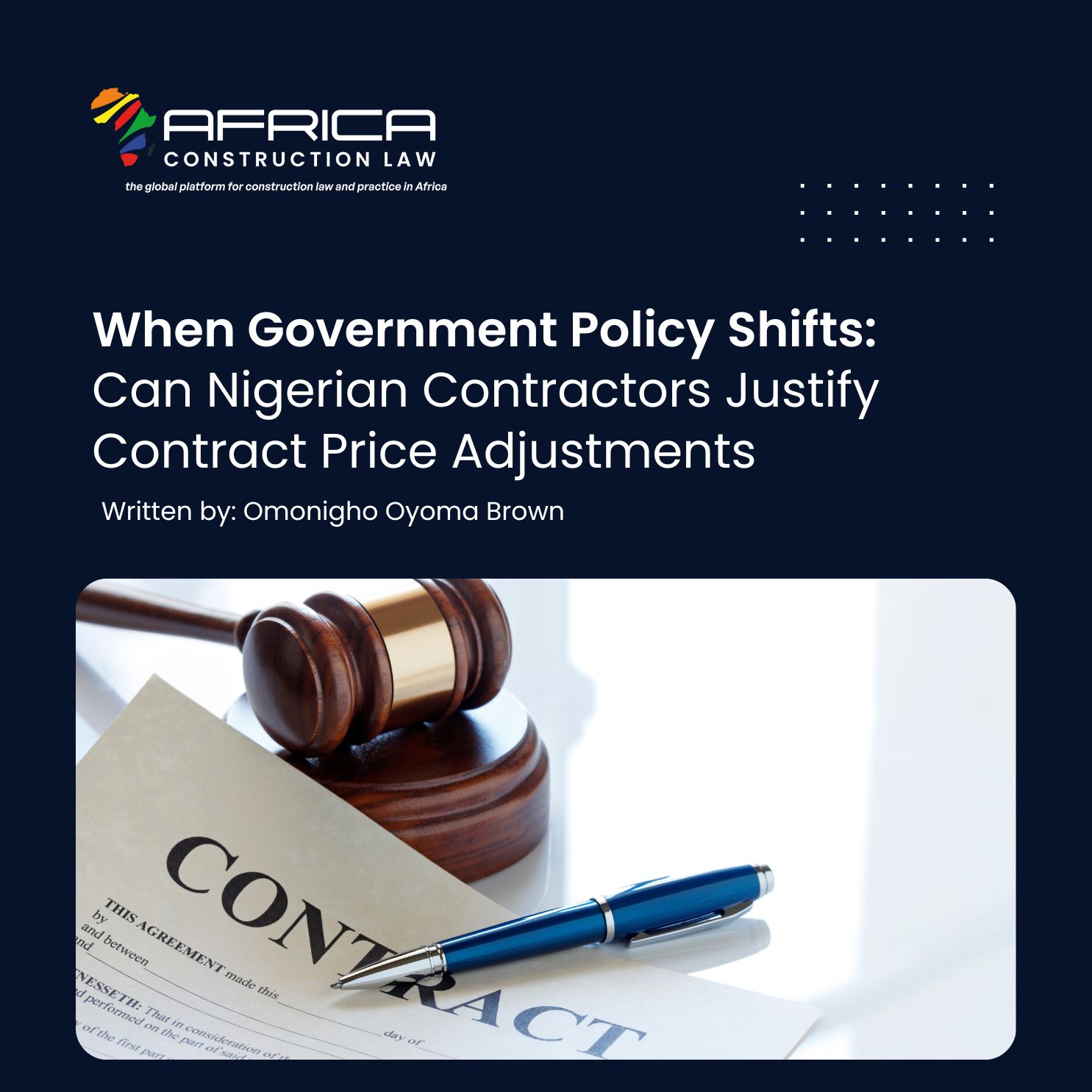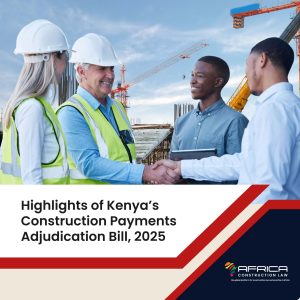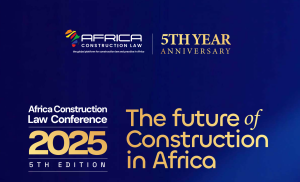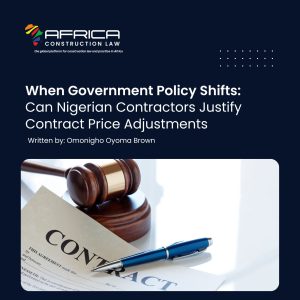When Government Policy Shifts: Can Nigerian Contractors Justify Contract Price Adjustments Without a ‘Change in Law’ Clause?
Written by: Omonigho Oyoma Brown
Introduction
In the dynamic world of construction and contracting, government activities like regulatory changes, fiscal policies, and administrative directives can have a considerable impact on project prices and time schedules. These changes can be difficult for contractors, especially if the contract does not have a “change in law” clause which typically allows for price adjustments in reaction to such changes.
But what happens if a contractor encounters such situations in Nigeria and there is no explicit contract clause addressing changes in government policy? Can they still claim or request a price review? This article discusses the legal possibilities accessible to Nigerian contractors seeking restitution in this circumstance.
Understanding the Legal Framework: Can Contractors Seek Price Review?
In the absence of a “change in law” clause in a contract, Nigerian contractors can rely on some legal and equitable principles to argue for a price adjustment and / or motivate contract renegotiation based on government actions. These principles are rooted in common law doctrines and judicial precedents, which offer flexibility and fairness, even when the contract does not specifically provide for such circumstances.
- Force Majeure and Implied Terms: Protection from Unforeseen Events
Many contracts contain force majeure clauses, which excuse performance in the event of extraordinary circumstances that are beyond the control of the parties involved. While government actions like sudden regulatory changes might fall under this category, the same are not always included in force majeure clauses in contracts. However, Nigerian courts may be willing to imply such terms based on the nature of the relationship and industry customs.
Even if a contract does not include a force majeure clause or include government actions as a force majeure event in the contract, Nigerian Courts may still find that governmental interference, especially if it is unforeseeable and outside the parties’ control, entitles the contractor to relief. Nigerian Courts might infer such a clause from the context of the agreement, the industry’s customs, or broader doctrines of fairness.
In Globe Spinning Mills (Nigeria) Plc v. Reliance Textile Industries Limited (2017) LPELR-42199(CA), the Court of Appeal recognized the applicability of force majeure clauses in contractual disputes when a party’s ability to perform is impeded by exceptional events. Accordingly, if government actions make it impossible or impractical to fulfil the contract’s terms, the contractor may have a legitimate claim for price adjustments.
- Equity and Fairness: Protecting Parties from Unjust Hardship
Even in the absence of force majeure clauses, Nigerian Courts frequently apply equitable principles to ensure fairness in contractual relations. If a government action leads to an excessive burden on one party (such as a contractor), the courts may intervene to adjust the contract’s terms to reflect the changed circumstances. This intervention is particularly common where strict enforcement of the original terms would lead to unjust enrichment or undue hardship.
The doctrine of rebus sic stantibus (“things standing thus”) can allow for renegotiation of terms when circumstances change significantly and is recognised under Nigerian law. This doctrine is rooted in the idea that contracts should evolve with changing conditions that are fundamental to the same, particularly when those conditions are outside the control of either party. While the direct invocation of this doctrine in Nigerian courts is rare, it is a recognized principle. Accordingly, a party that suffers undue hardship or faces unjust enrichment of the other party due to government-induced disruptions and strict contract enforcement may seek relief from courts under equitable doctrines.
- Sector-Specific Regulations and Statutory Frameworks
While there is no general statutory provision mandating price adjustments due to government action, certain industries in Nigeria are subject to regulatory frameworks that may provide for such adjustments. For instance, the Public Procurement Act, 2007 (the “PPA”) governs contracts in the public sector, and while it does not explicitly allow for price revisions based on government actions, it emphasizes fairness and transparency in procurement processes (See Section 16(1)(d) of the PPA). In some cases, the government might amend procurement terms to reflect changes in policy, and this could justify contract price adjustments.
Additionally, the Nigerian Bureau of Public Procurement (BPP) emphasizes the importance of price adjustment provisions in public contracts, especially for projects with long completion periods or those exposed to volatile market conditions. Price adjustment formulas typically factor in labor, materials, equipment costs, and inflation indices to fairly estimate cost escalations. Sub-Paragraph 22.5 of the Standard Bidding Document for Procurement of Works developed and published by the BPP, captures the need for contract price adjustments during the performance of the contract and application of an adjustment formula that should be captured in special contract conditions in accordance with the provisions.
- Doctrine of Frustration: When Contracts Become Impossible to Perform
Under Nigerian contract law, frustration occurs when an unforeseen circumstance or event not caused by either party to a contract and beyond either party’s control, renders further contract performance impossible, illegal or radically different from what was originally agreed upon. In Araka v. Monier Construction Co. (Nigeria) Ltd (1978) 6-7 SC, the Supreme Court held that frustration occurs when an unforeseen event alters the fundamental nature of the contractual obligations, rendering them impossible to perform, and enforcing a contractual obligation in such circumstance may be tantamount to injustice.
Accordingly, if an event which the contracting parties did not anticipate, foresee, or assume could happen (at the time of entering the contract) occurs, and such occurrence significantly changes what was originally contemplated by the parties, then the contract will be deemed discharged for all intents and purposes under the frustration doctrine. When a contract is frustrated, it becomes automatically terminated by operation of law, and the parties are discharged from further obligations, but rights accrued before frustration may still be enforced.
Frustration is however a narrow doctrine that only applies in exceptional cases to avoid undermining contractual certainty, and not just in cases of inconvenience or hardship. Notably, Nigerian courts apply a strict standard when assessing claims of frustration such that merely showing hardship, delay, or financial difficulty may not be enough. A contract is not frustrated because it becomes more expensive or time-consuming.
Based on the Supreme Court’s ruling in Nwaolisah v. Nwabufoh (2011) LPELR-2115 (SC), the following cumulative elements must be satisfied for a party to successfully invoke frustration:
- The frustration event must have occurred after contract formation.
- The event must have been genuinely unexpected and not contemplated by the parties.
- The frustrating event must be fundamental, striking at the very root of the contract.
- The occurrence of the event must not be caused or contributed to by the fault or act of either party to the contract – it must be external and unavoidable.
- Performance of the contract must not just be more difficult or costly, rather, it must become impossible or substantially different from what was agreed by the parties at the time of contract formation.
- The contract provisions must not have already addressed and allocated the risk stemming the occurrence of the event.
- The party claiming frustration must show that it is impossible to find any viable workaround, alternative or substitute. If the party could have found another way to perform (even at a higher cost), frustration fails.
The appellant in this case (G.N. Nwaolisa – a businessman), imported goods from Italy into Nigeria without having the required import licence. The appellant subsequently contracted the respondent, (Paschal Nwabufoh – a clearing agent) to procure the required import licence and clear the goods at the Nigerian port. The respondent procured the import license but failed to clear the goods, leading to the Nigerian Ports Authority declaring the goods as over-time cargo and selling off the same. The appellant then sued the respondent for breach of contract, claiming damages for loss of the goods, however, the Trial Court and Court of Appeal found both parties equally at fault (in pari delicto) and dismissed the suit on that basis. On further appeal, the Supreme Court ruled in favour of the appellant, rejecting the respondent’s defence of frustration of contract due to the Nigerian Civil War, and related disturbances which he claimed fundamentally disrupted his contractual obligation to clear the goods.
The Supreme Court rejected this defence, holding that the circumstances did not amount to frustration because the respondent was still capable of performing his obligations, and the event did not make the contract radically different from what was agreed. Thus, frustration was not established to discharge the contract.
This strict application of the frustration doctrine was applied similarly, in WECO Engineering and Construction Co. Ltd v. Dufan (Nig) Ltd & Anor (2019) LPELR-47211(CA), Where the Court emphasized that the party alleging frustration must prove that the event was unforeseen, was not caused by the fault of either party, and made contractual performance impossible or radically different from what was agreed.
From the foregoing, the frustration doctrine does not support a claim for price re-adjustment or partial performance as it ends the contract when successfully invoked through court action. However, reliance on this doctrine may serve a strategic business purpose specifically incentivizing parties to renegotiate the contract when any change in law makes performance impossible. This is because, parties to a contract ultimately aim to see the same to a successful conclusion, thus, in such circumstances, parties may be inclined to prevent a total breakdown of the contract by renegotiating its terms.
What Contractors Should Do: Practical Steps to Protect Their Interests
Given the complexities surrounding price reviews due to government actions, contractors should take the following proactive steps to safeguard their rights:
- Draft Comprehensive Contracts: Include clear change in law and force majeure clauses that address potential government actions. This proactive measure can prevent disputes down the road.
- Special Conditions of Contract (SCC): Supplement general contract conditions with specific contract conditions to address specific project needs, including price adjustment, advance payment terms, and variation procedures, thereby embedding flexibility to accommodate government policy changes.
- Document the Impact: Keep detailed records of how government actions such as tax increases, regulatory changes, or policy shifts affect the cost and performance of the contract. This evidence will be crucial if a claim for price adjustment is necessary.
- Engage Clients Early: Open communication with clients is essential. If a significant government action affects the project’s viability, contractors should discuss potential adjustments early on with their clients to avoid disputes.
- Seek Legal Guidance: Contractors should always seek legal advice to understand the full range of legal options available. A legal expert can help assess the situation, explore possible claims for frustration or force majeure, and guide the renegotiation process.
Conclusion
In Nigeria, contractors can pursue price adjustments even without a “change in law” clause by relying on established legal doctrines such as force majeure, equity, and frustration. While there may not be an explicit statutory provision that grants automatic rights to price reviews, Nigerian law provides contractors with sufficient legal tools to seek fair compensation or to motivate contract renegotiation when faced with significant, unforeseen government actions that alter the terms of their contracts.
References
Chukwuemerie, A. I. (2002). Law of Contract in Nigeria. Nigerian Institute of Advanced Legal Studies.
Olaniyan, A. (2020). Governmental Actions and Commercial Contract Adjustments in Nigeria – Cambridge Journal of African Law
Standard Bidding Document for the Procurement of Works, prepared by the Bureau of Public Procurement for the Procurement of Works and Related Services under National Competitive Tendering (NCT) when financed by the National Budget. http://library.procurementmonitor.org/backend/files/SBD_Works%5B1%5D.pdf
Titus, O., Ariffin H, and Ali K. (2023). Construction dispute and contract incompleteness in Nigeria Construction Industry. Ain Shams Engineering Journal. Volume 14, Issue 10. https://www.sciencedirect.com/science/article/pii/S2090447923000424?utm_source=chatgpt.com
Ujebe, N., Ogbonnia, C, and Nwafor M. E. (2023). Bureau of Public Procurement in Nigeria and Price Adjustment Procedures in Project Construction. NG-Journal of Social Development. Vol. 12 Issue 1. https://www.ajol.info/index.php/ngjsd/article/view/271024


















